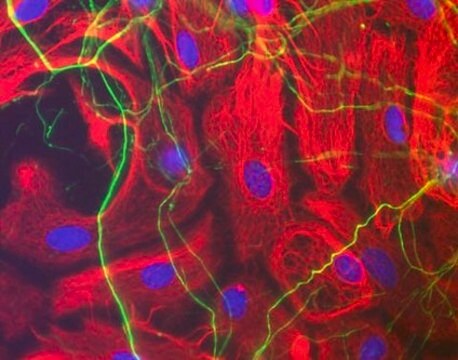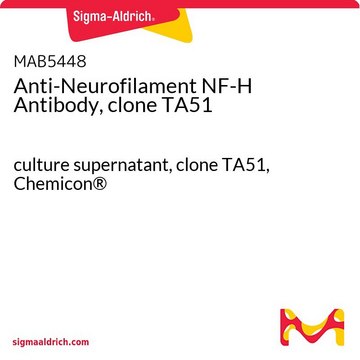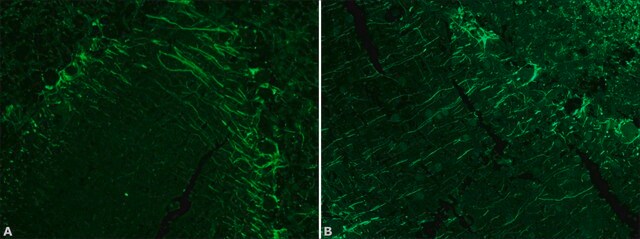MAB5446
Anti-Neurofilament NF-H Antibody, tail domain (Phosphate dependent), clone RMO-24
ascites fluid, clone RMO-24, Chemicon®
About This Item
Recommended Products
biological source
mouse
Quality Level
antibody form
ascites fluid
antibody product type
primary antibodies
clone
RMO-24, monoclonal
species reactivity
human, rat
manufacturer/tradename
Chemicon®
technique(s)
ELISA: suitable
immunohistochemistry: suitable
immunoprecipitation (IP): suitable
western blot: suitable
isotype
IgG1κ
NCBI accession no.
UniProt accession no.
shipped in
dry ice
target post-translational modification
unmodified
Gene Information
human ... NEFH(4744)
rat ... Nefh(24587)
Related Categories
Specificity
Immunogen
Application
Neuroscience
Neurofilament & Neuron Metabolism
Neuronal & Glial Markers
Immunohistochemistry. The antibody has been used successfully on Bouin′s and alcohol-fixed paraffin-embedded or frozen tissue sections. Formalin-fixed paraffin-embedded tissue sections require pretreatment with trypsin.
Immunoprecipitation
Optimal working dilutions must be determined by end user.
Physical form
Storage and Stability
Analysis Note
Positive Control: Brain
Legal Information
Disclaimer
Not finding the right product?
Try our Product Selector Tool.
recommended
Storage Class Code
10 - Combustible liquids
WGK
WGK 1
Flash Point(F)
Not applicable
Flash Point(C)
Not applicable
Regulatory Listings
Regulatory Listings are mainly provided for chemical products. Only limited information can be provided here for non-chemical products. No entry means none of the components are listed. It is the user’s obligation to ensure the safe and legal use of the product.
JAN Code
MAB5446:
Certificates of Analysis (COA)
Search for Certificates of Analysis (COA) by entering the products Lot/Batch Number. Lot and Batch Numbers can be found on a product’s label following the words ‘Lot’ or ‘Batch’.
Already Own This Product?
Find documentation for the products that you have recently purchased in the Document Library.
Our team of scientists has experience in all areas of research including Life Science, Material Science, Chemical Synthesis, Chromatography, Analytical and many others.
Contact Technical Service



